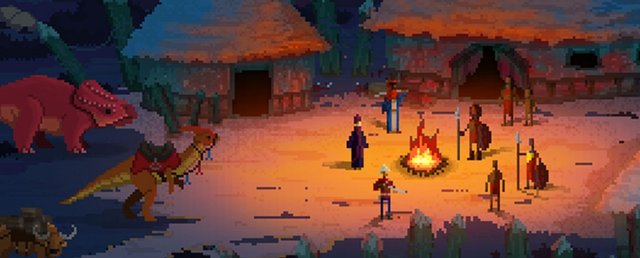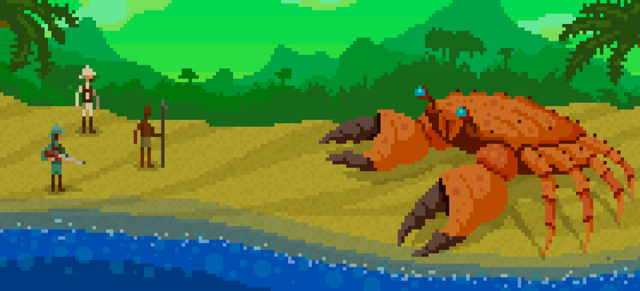How to translate The Curious Expedition: An Easy Guide for Everyone
The Curious Expedition is an insanely fun open-source game. Distant lands, adventures, mystery, monsters, weird food, threatening Ape Men, dinosaurs, scary butterflies, hot air balloons, mummies, Nikola Tesla and (well… it is obviously implied) danger! As LM of the Da-Vinci/Utopian Spanish translation team, I rejoiced myself finding that reviewing and working on this game is as extraordinarily entertaining and enriching as it is playing it. However, the complex way the game is built makes its translation a very delicate responsibility.
After a long conversation with @phgnomo on the Discord channel, checking a lot of translations and comments submitted by administrators and contributors of the game, and discussing proper ways to deal with different translation cases the best way possible, we came out with very precise and useful conclusions.
We figured that many contributors share the doubts we had and there are no general guidelines or instructive material on how to approach the translation of the project. For those reasons, here I present a simple guide on how to translate The Curious Expedition project.
An Easy Guide to Translate The Curious Expedition
Note: All the examples I’ll refer in this guide are from translating the game to Spanish since is my native language. Leaving that aside, the specifications written here should work with other languages.
The dynamics of this game make the experience of each player different. Every decision taken leads the players to different outcomes, scenarios and characters, throughout the entire timeline of the story.
In the game source, the strings that narrate possible situations in similar scenarios are the same. Those scenarios with different possibilities (as if they took place in the same space but parallel dimensions) are depicted in the text through the use of square brackets [ ]. Inside of them, all possible situations are separated with a vertical bar | . The writing of those events can be adjusted so they all coherently fit in the narrative.
Example:
Ahead of us, there was [an heroic white horse|a little stinky donkey|nothing].
Translation:
Ante nosotros [estaba un heróico caballo blanco|yacía un pequeño y apestoso burro|no había nada].
The gender of playable characters (from whose point of view the story is being told), characters they interact with, and the adjectives, verbs and connectors related to them will also change according to each gaming experience. The translation of words that make allusions to the gender of characters can be done through two different methods:
The first method is the use of variables:
Since the grammar of English language is different from others, the original text has only variables for pronouns. Variables can be added during the translation of strings as long as they refer directly to the characters alluded in the string you're translating. The use of that new variable implies it has to be added (if not there already) to the string that contains all the variables of the game. We will call that string as the “Variables String”.
These are the URLs of the Variables String for each language: Simplified Chinese, Traditional Chinese, Czech, French, German, Greek, Indonesian, Italian, Japanese, Korean, Nigerian Pidgim, Polish, Portuguese, Brazilian Portuguese, Russian, Spanish, Arabic, Turkish, Ukrainian and Vietnamese.
Let's say, for example, that a string says:
- “$He was very angry with me.”
The variable #He has two different values, one of which will be placed into the game according to the particular story a player is having. The first of those values, reflected in the Variables String, is male; the second one is female. They are expressed like this in the Variables String:
- $he=él|ella
Now...
In Spanish, that sentence ("$He was very angry with me") is translated:
- Él estaba muy molesto conmigo, if $he is male.
And:
- Ella estaba muy molesta conmigo, if $he is female.
You can add a variable for the gender of that word to be accord with the gender of the referred character in the timeline the player is. So you add a variable called: $molesto (angry).
Then, you write the translated phrase:
- "$He was very $molesto conmigo"
And you add that new variable to the Variables String as:
$molesto=molesto|molesta
That will make the word “molest@” addapts to the particular game of the player.
The second method is the use of curly brackets:
Curly brackets { } can be added to the text to express both genders of words without need to referring them inside of the Variables String. This will only work if they’re not part of text that's already inside other brackets. The word whose gender will adapt has to refer to the character alluded in the string.
Example:
- #He was so happy to see us...
Translation:
- #He estaba tan {contento|contenta} por vernos...
If that was part of the text inside other brackets, it WOULDN’T be possible. Like in this other example:
- #He was [so happy to see us...|truly mad at us... How could we left #him stranding in the middle of nowhere?]
THIS WON’T WORK. Instead, you would have to go for the first method and add variables.
Recommendations and clarifications:
The following depends entirely on the grammar, characteristics and the whole set of words at your disposition in the language you’re making the translation to. For Spanish, when possible and coherent, I recommend to use sentences that allow both genders to be referred with the same words, so there is no need of use neither of the methods explained before.
Use the literary styles of your languages when you’re making these translations. This exploits the atmosphere the game has succeeded creating and hooks the players to follow the story until the end… Like a really good book!
Those characters that are gender-specific in the original text don’t need to be translated to be gender-open. For example: The Ape Emperor (https://crowdin.com/translate/the-curious-expedition/10/en-es#13056) and the (so-called) Empress of Maschmeschistan (https://crowdin.com/translate/the-curious-expedition/3/en-es#12481).
The capitalization, punctuation and spacing of the text inside brackets will reflect in the one displayed to the players. Make sure it is correct and fits with the whole narrative. Also, know that capitalization affects variables too.
No, translators are not obligated to use variables in their translations in substitution of the variables in the original text. If your language and your writing skills allow the translation of the original text to be gender-open without having to use variables, go ahead… It is fine!



I continue to be delighted by the variety of contributions we've been getting to the #iamutopian tag. Utopian has so many different aspects, and it's awesome to see.
This post, specifically, was a great contribution. Very specific and detailed, and an interesting read.
It did, however, suffer from some issues of style and grammar, which are particularly glaring in a post that discusses English grammar. I'll cite some examples.
"I rejoiced myself finding." I have to say, this was a bit difficult to parse, as "rejoiced myself" is not an expression. I think you meant something along the lines of "I rejoiced upon finding"?
"After a long conversation with @phgnomo on the Discord channel, checking a lot of translations and comments submitted by administrators and contributors of the game, and discussing proper ways to deal with different translation cases the best way possible, we came out with very precise and useful conclusions." This is a long sentence. Super long. So long. It desperately needs to be broken up and simplified for better readability. How about:
"I had a long conversation with @phgnomo on the Discord channel. We checked many translations and comments submitted by administrators and contributors to the game, and discussed the best ways to deal with different translation cases. We came out with some very precise and useful conclusions."
Your contribution has been evaluated according to Utopian policies and guidelines, as well as a predefined set of questions pertaining to the category.
To view those questions and the relevant answers related to your post, click here.
Need help? Write a ticket on https://support.utopian.io/.
Chat with us on Discord.
[utopian-moderator]
Thank you for your review, @didic!
So far this week you've reviewed 21 contributions. Keep up the good work!
Thanks a lot for the feedback!
As a translator, I'm used to adapt English grammar and idiomatic expressions to Spanish, but here I had issues doing the inverse process. I'll take your advice to improve my writing style.
It's really good to know that this information is valuable for the community and it is well received. If I get any update regarding this topic, I'll share it with you all!
In my day job, I translate from English to Hebrew, so these difficulties are well known to me and perfectly understandable.
Someone just shared this with me and woah, that's awesome!
As a LM myself, but also an Utopian staff member, I greatly appreciate your efforts in making sure translations of all language meet the highest quality standard. Keep up the great work!